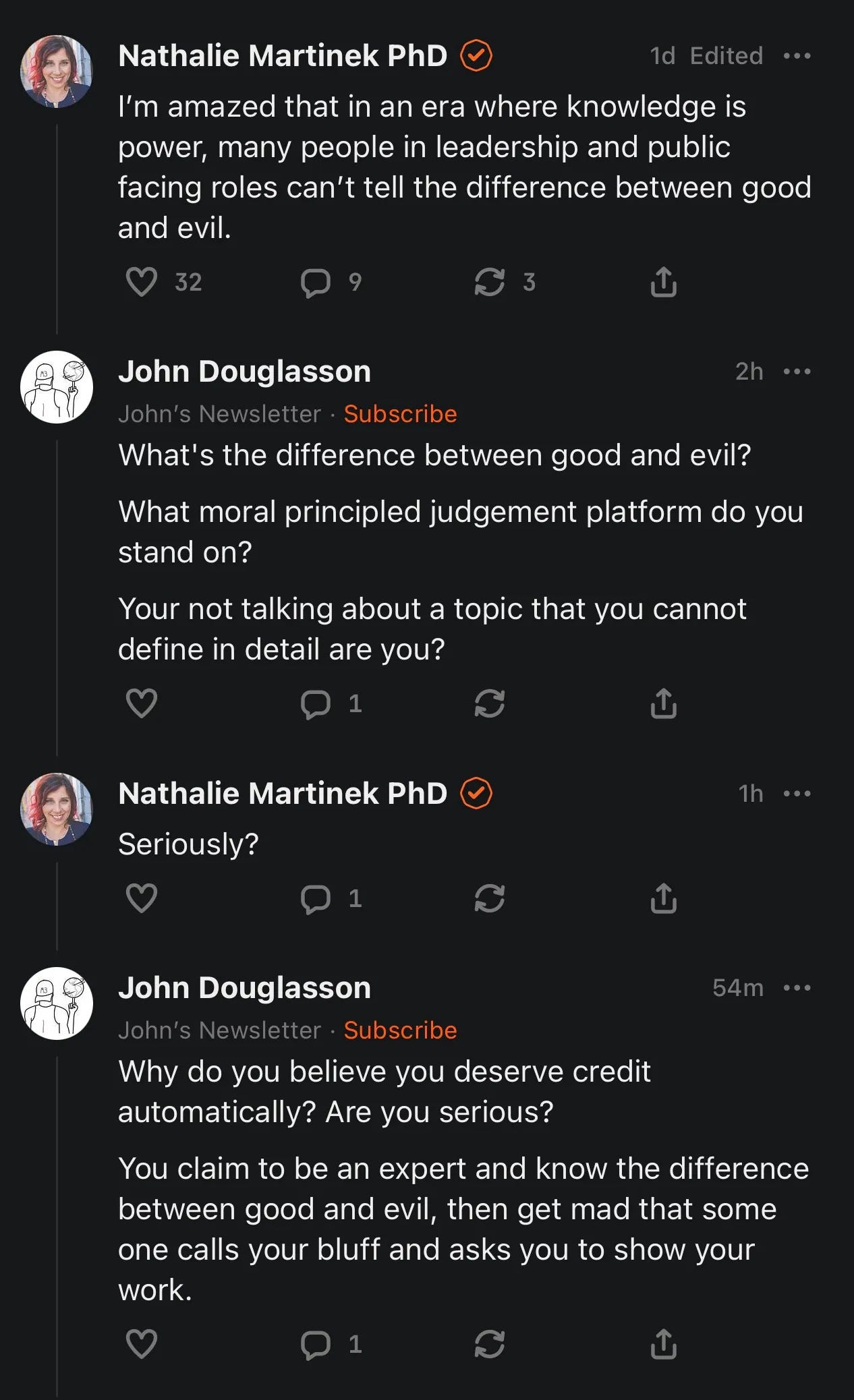How to handle Cluster B behaviour on Substack
Control the trolls
I love Notes because its ecosystem introduces you to writers you wouldn’t necessarily encounter through searches. It’s also a space to test ideas and engage in dialogue. But every once in a while, I post something subtly provocative that gets under someone’s skin and they take it personally.
I know they’re pissed off at me when they:
call me a narcissist.
project - accuse me of doing the very thing they’re doing in their accusation.
mock me for adding PhD to my name.
Many wonder why people react this way and whether they’re aware of it. I don’t believe most are conscious of what they’re doing; they’re in fight mode after feeling attacked. Their bodies respond as if they’re in real danger, dissociating from reality and attributing their feelings of being attacked to a genuine threat when in reality it’s just a sentence they interpreted uncharitably.
Chronic insecurity fuels narcissistic behaviours aimed at dominating and diminishing anyone who challenges them.
Why the need to dominate?
It’s instinctual.
Status, admiration, control, and power act as shields to protect the ego from wounds and warding off the fear of worthlessness. One strategy of self-protection is to make ourselves feel and appear superior.
I’ve previously written about parasocial relationships and why people lash out at strangers online over a single sentence. This time, I want to analyse a rant I received, breaking down its antisocial strategies so you can spot them and respond accordingly.
Exhibit A
I’m not claiming my original post was flawless. However, in a society where people could engage with decorum and respect, some (unconsciously) choose otherwise. While flaunting their intellectual superiority, they fall victim to their own impulses - resulting in their inability to practice self-restraint or self-reflection.
In an ideal world, online discussions would be shaped by strong reading comprehension and a willingness to pause, consider the author's intent, and set aside knee-jerk biases that get in the way of objectivity.
Let me preempt this by saying: people like this are energy suckers. They don’t care about you or your ideas. They’ve already sized you up and decided they’re intellectually and morally superior.
Their fixation?
Keep that in mind when you feel the urge to respond. Starving their need for attention and domination is in your best interest.
The Substack Contrarian Provocateur
Allow me to introduce you to the Contrarian Provocateur - A pseudo-intellectual troll with a superiority complex.
John’s responses feature patterns of narcissistic behaviour:
Intellectual authority test. He asks pointed questions i.e. challenging me to define good vs evil but isn’t actually interested in my answer. His goal is to dominate through debate tactics to put me on the defensive. He’s looking for weaknesses in my responses so he can go in for the intellectual kill.
Shifting the burden of proof. His follow up “You claim to be an expert... then get mad that someone calls your bluff” suggests that he believes he already knows me and my type. Now I owe him a detailed defense because I made a broad statement without an explanation. This is a control move, shifting the burden of proving myself (which is more than proving my intellectual authority) onto him while he provides no stance of his own.
Escalating aggression and personal attacks. I refused to engage on his terms because I saw his domination tactics from the start. This pissed him off, leading to escalation. He accused me of hypocrisy, projection and toxic feminism, revealing his true intent: to attack the person who made him feel uncomfortable. Ironically, he’s engaging in projection - unleashing his own self-loathing and resentment of unrecognised greatness onto me. His mockery of my PhD is a dead giveaway of his obsession with status and prestige, believing those letters hold the power he desperately seeks (they don’t). Since I didn’t submit to his attempted domination, I am no longer worthy of respect.
Emotional manipulation. He used laughing emojis to call my refusal to engage hilarious which is an attempt to belittle me despite his excessive emotional investment in this exchange. His claim “You attack the person and make ridiculous claims to project victimhood” is more projection. He initiated this with open antagonism yet positions himself as the victim of an unfair attack The irony is lost on him.
Misuse of psychological concepts. He weaponises psychological terms, accusing me of projection, gaslighting, and narcissism. He’s not attacking my behaviour - he’s attacking my credibility so he can frame himself as the rational truth-teller and me as the deceptive manipulator.
Many of you who study Cluster B behaviour and follow Josh Slocum’s work (better yet, subscribe!) on Cluster B whispering will recognise the classic power struggle tactics at play here:
forcing you into a defensive position
moving goalposts when you don’t respond as expected
escalating to personal attacks when domination fails
The Contrarian Provocateur expected me to engage, explain, justify myself, and submit to his superiority. When I refused, hostility replaced persuasion, exposing his real motive.
How this is Cluster B behaviour
To be clear, I’m not diagnosing anyone. I’m simply highlighting narcissistic and antisocial traits that are commonly associated with Cluster B personality disorders, hence, Cluster B behaviours. Here are some:
Grandiosity and superiority: He positions himself as the rational, enlightened one while belittling me.
Need for control: He demands I justify myself on his terms.
Accountability averse: Instead of engaging meaningfully, he deflects, projects, and attacks.
Manipulation: He uses accusations of projection, gaslighting, and hypocrisy as weapons rather than actual observations.
Empathy deficit: There is no real attempt to understand me, only to dominate the interaction.
Deception and manipulation: Twisting words to fit his narrative rather than actually debating.
Exaggeration: He calls my refusal to engage hilarious and resorts to extreme accusations.
Attention seeking: Escalates things when I don’t play by his rules.
How to deal with bad faith debaters
It’s tempting to take the bait and go to war but it will only leave you frustrated. No temporary sense of superiority is worth it.
I chose a restrained, neutral, and assertive response to shut down the exchange. Then I blocked him.
There are, of course, other ways to dominate the interaction:
Don’t engage deeply: they’re not looking for truth, so don’t waste your energy.
“I don’t engage in bad faith debates.”
"You’re making a lot of assumptions about me instead of engaging with the actual topic. I’ll leave you to your projections."
Call it out:
"You're not actually engaging with my point."
“Ah, you’ve come to show me your intellectual superiority. Not interested.”
“It seems you want to argue with me so you can tell me all the ways that I’m wrong. Is this post really worth that energy?”
“I will respond once you conduct a thorough self-examination of your reaction to my post.”
Mock or play dumb: make them work for it.
“I don’t get what you’re asking me.”
“Are you saying you don’t know the difference between good and evil?”
"Are you saying good and evil are different? Mind blown."
“Am I about to get a masterclass in philosophy? Lucky me!”
Walk away: they thrive on attention. Starve them.
Overall, your silence is best the power move.
What are your strategies for responding to Cluster B behaviour on Substack and beyond?
What’s your experience of Cluster B behaviour on Substack?
Thanks to The Starfire Codes for being my laughter support and sanity tracker after bearing witness to this exchange. If you enjoy memes that set the record straight about these times along with other incisive insights, subscribe to her Substack!
Hack narcissism and support my work
I believe that a common threat to our individual and collective thriving is an addiction to power and control. This addiction fuels and is fuelled by greed - the desire to accumulate and control resources in social, information (and attention), economic, ecological, geographical and political systems.
While activists focus on fighting macro issues, I believe that activism also needs to focus on the micro issues - the narcissistic traits that pollute relationships between you and I, and between each other, without contributing to existing injustice. It’s not as exciting as fighting the Big Baddies yet hacking, resisting and overriding our tendencies to control others that also manifest as our macro issues is my full-time job.
I’m dedicated to helping people understand all the ways narcissistic traits infiltrate and taint our interpersonal, professional, organisational and political relationships, and provide strategies for narcissism hackers to fight back and find peace.
Here’s how you can help.
Order my book: The Little Book of Assertiveness: Speak up with confidence
Support my work:
through a Substack subscription
by sharing my work with your loved ones and networks
by citing my work in your presentations and posts
by inviting me to speak, deliver training or consult for your organisation





Grateful you did this-almost no one recognizes what this interaction really is, let alone has the knowledge to illustrate in steps what's really going on for bewildered normal people. Thank you.
Good stuff. Having been a woman with male-typical interests on social media for awhile (I had 17,000ish followers on Twitter when I left a few years ago, in an era when that was a LOT for a personal account) I have been through every conceivable method of dealing with this stuff. I've finally settled on defaulting to "probably bad faith" for everyone who isn't a paid subscribers. I don't like this, and I try to be quick to apologize when I get it wrong, but that heuristic is like 80% accurate according to what I can tell. Which is sad.